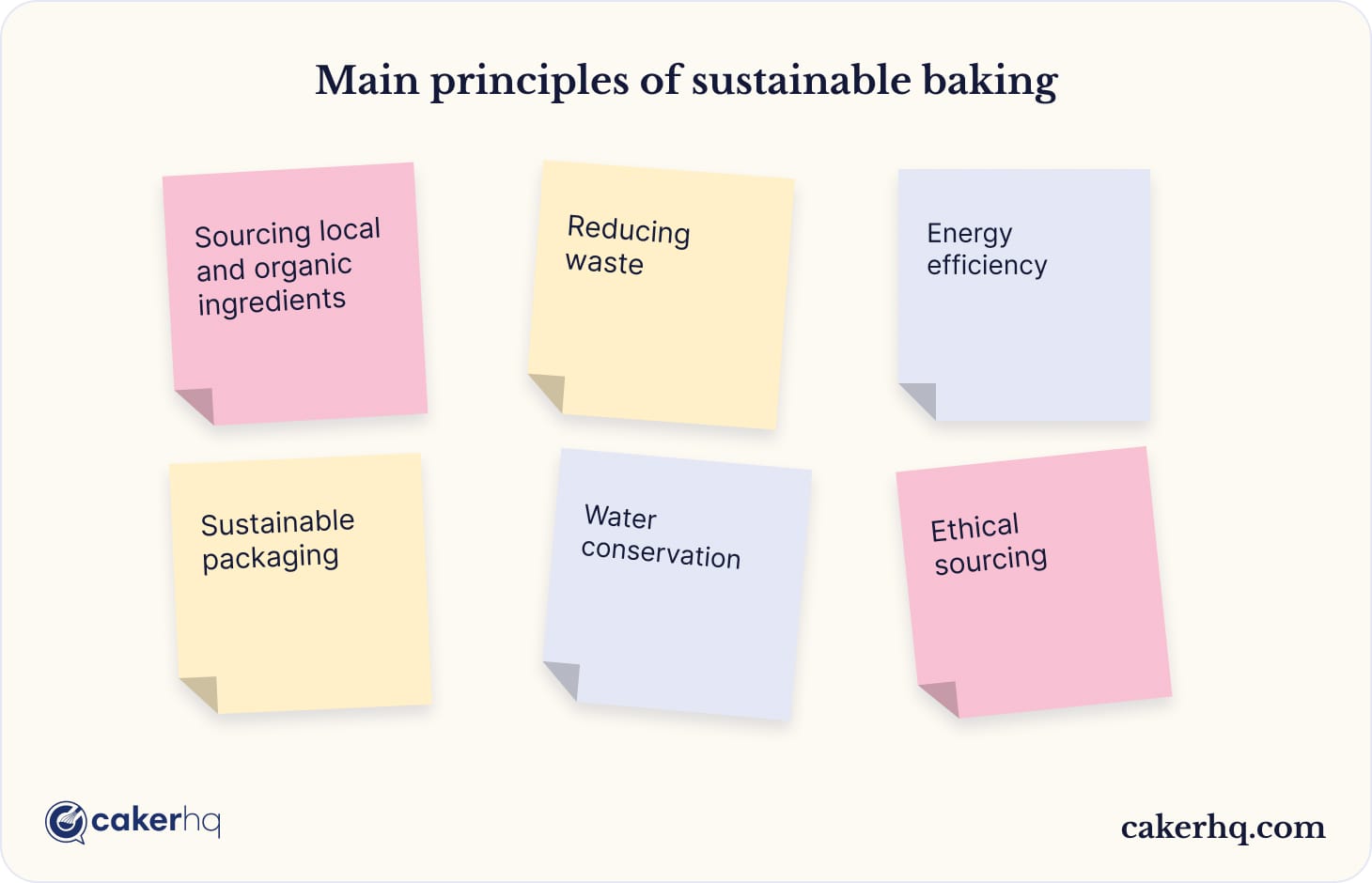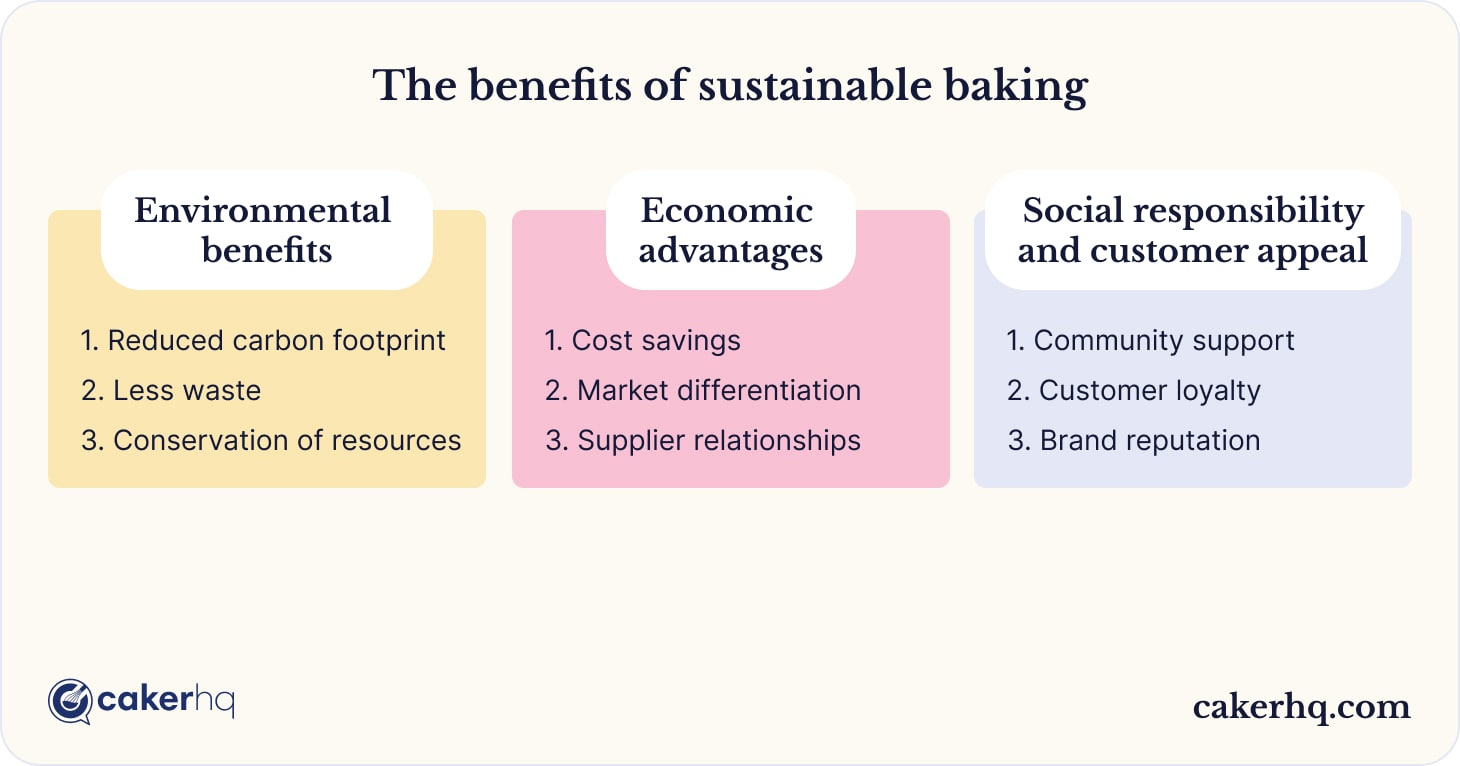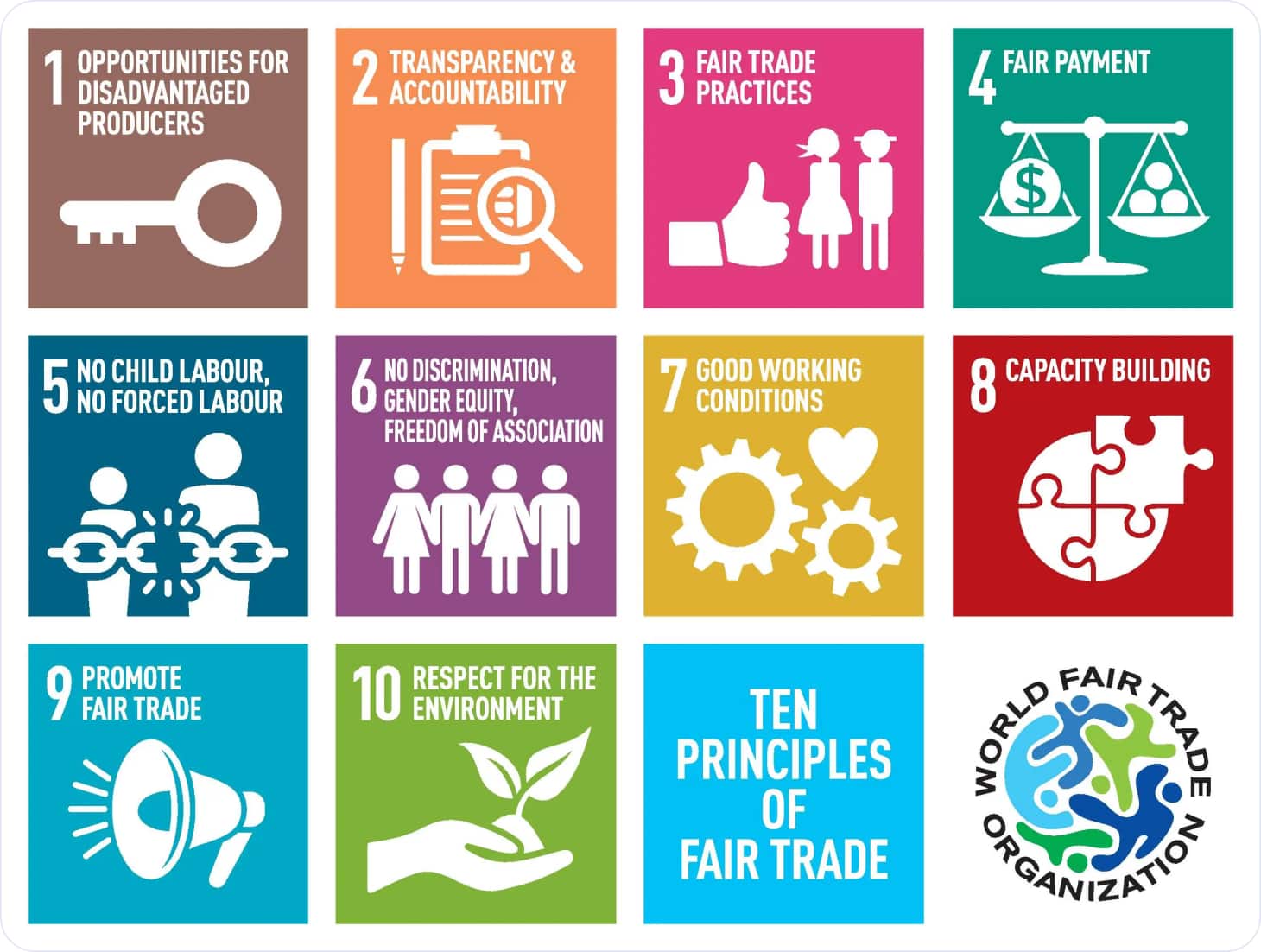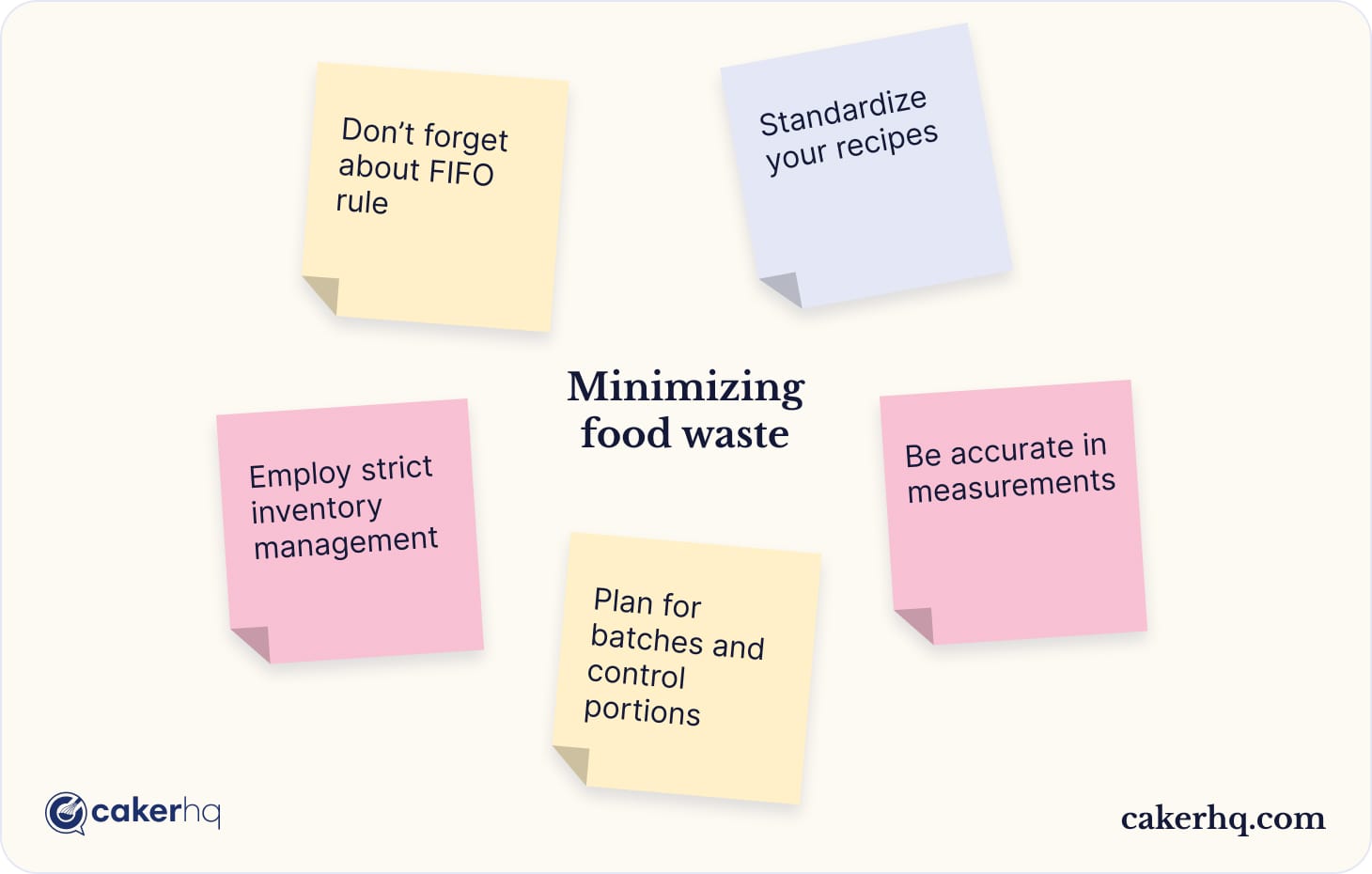In the cake-making business, the strategies you incorporate into business processes matter a lot. They affect the businesses’ effectiveness and ability to adapt to new challenges and offer something new to buyers.
A sustainable cake-making process is one such strategy, along with tonnes of benefits it provides. Incorporating it may not be easy, yet the results it brings are definitely worth it. In this article, we will look at sustainable baking closer, overview various aspects of it as well as provide some tips on how to adopt it.
What is sustainable baking?
In short, it is a practice of eco-friendly baking, where you rely on methods that have minimal negative impact on the environment. These practices encompass a lot: ingredients, equipment, and techniques that promote environmental stewardship, resource conservation, and social responsibility. There are several principles of sustainable baking:
- Sourcing local and organic ingredients. When you choose organic and/or locally produced ingredients, you contribute to reducing the carbon footprint caused by the transportation of the goods while also supporting local economies.
- Reducing waste. With sustainable cake-making, you can employ various strategies to minimise waste in all stages of baking, from ingredient procurement to packaging.
- Energy efficiency. In addition to economising water and packaging, you can also use energy-efficient appliances and practices to reduce energy consumption.
- Sustainable packaging. Utilising eco-friendly packaging for business that are biodegradable or recyclable.
- Water conservation. Coming up with actions to minimise water usage in baking and cleaning processes.
- Ethical sourcing. Ensuring that ingredients are sourced in a manner that is ethical and fair to producers and workers.
In the scope of the article, you may still wonder why is sustainable baking practices are important. Well, it would be enough to look at traditional ones and their impact.
- High carbon footprint. The transportation of non-local ingredients contributes significantly to greenhouse gas emissions.
- Excessive waste. Conventional baking practices often lead to tons of food and packaging waste that pollutes landfills, soils, and oceans.
- Energy consumption. Many traditional baking methods rely on energy-intensive equipment, leading to higher electricity usage.
- Chemical usage. The use of non-organic ingredients often involves pesticides and fertilizers that can harm ecosystems.
- Water usage. Traditional baking can be water-intensive, contributing to resource depletion, especially in areas facing water scarcity.
The benefits of sustainable baking
Although sustainable baking practices may be challenging to adopt right away, they have several substantial benefits in various areas. Let’s take a look what benefits can sustainable baking bring for the environment, economy, and social responsibility.
Environmental benefits
By using local and organic ingredients, sustainable baking reduces the emissions associated with transportation and chemical usage. Consequently, using organic ingredients naturally reduces waste, allowing you to recycle more. Besides, this approach fosters energy-efficient practices and equipment to lower energy consumption while also popularising water conservation measures to reduce water usage.
Economic advantages
In terms of economics, eco-friendly approaches often help economise in the long-term perspective. For example, energy-efficient appliances lower the bills you have to pay, whereas waste minimisation techniques often reduce disposal costs. Additionally, positioning your business as an eco-friendly business can attract environmentally conscious customers, allowing you to stand out in a competitive market.
Besides, to further differentiate yourself, source ingredients locally and ethically, as it can build stronger relationships with suppliers and reduce costs associated with long supply chains.
Social responsibility and customer appeal
After all the environmental and economic benefits, customer appeal to your business is a natural advantage you also get. For instance, by sourcing locally, you show regional small businesses and farmers your support, helping the economy in the region.
Furthermore, consumers are increasingly valuing sustainability and ethical practices. Demonstrating a commitment to these values can make your customers more loyal to your business, as well as promote it for new clients.
Read also: Building Lasting Relationships with Cake Clients
After all, adhering to sustainable practices expresses your strong commitment. Naturally, it can enhance your brand’s reputation, making it more attractive to both customers and potential business partners.
Sourcing eco-friendly ingredients
Organic and local ingredients
Such products are made without fertilizers, genetically modified organisms (GMOs), and synthetic pesticides. Therefore, they are much more beneficial to use because:
- You use healthier products. Although it is a known fact, remember that organic ingredients are free from harmful chemicals and residues, making your baked goods healthier.
- You care about the environment. As mentioned earlier, ordering local natural products supports farmers in your area. They, in turn, often use organic farming practices aimed at conserving water, reducing pollution from synthetic chemicals, and preserving soil health.
- You support biodiversity. Purchasing organic and local ingredients supports organic farming, which in turn supports biodiversity. Your purchases help farmers’ businesses, while fostering the culture of local sourcing.
Sourcing local ingredients is not challenging either! Basically, it all comes down to finding producers and suppliers in your area, be it a city or a state.
For instance, you can attend farmers' markets as they are a great place to find fresh, locally grown produce and build relationships with local farmers. Additionally, there is a CSA organisation (Community Supported Agriculture), which you can subscribe to. It provides a regular supply of local, seasonal produce directly from the farm.
Nothing stops you from partnering with local farms. DIrect partnerships are easy to work with, as they often work without a middleman. Besides, they are perfect for granting you a reliable supply of fresh ingredients.
Looking to showcase and sell your cakes? Become a professional with CakerHQ! Sign up
Fair Trade and ethical sourcing
Fair Trade is a modern movement that focuses on ensuring fair salaries for workers in the industry, sustainable practices for producers, and ethical working conditions. It promotes equitable trade relationships, improving livelihoods, and supporting community development through certified products.
When sourcing products, make sure you order ones with a Fair Trade mark, as this will support the initiative. This way, you will support Fair Trade practices, which aim to improve the livelihoods of farmers and workers. Besides, ethical sourcing encourages sustainable agricultural practices.
Finding such ingredients shouldn’t be difficult, too. First, research ingredients with Fair Trade or similar ethical certifications. Manufacturers that support the initiative often put special marks and labels on their products as it’s also beneficial for them.
Source: World Fair Trade Organization
Investigate your suppliers' sourcing practices. This way, you can make sure they work with ethical standards in mind. Even more straightforward, it is absolutely fine to ask them straight away about work conditions and sourcing.
Plant-based and alternative ingredients
Plant-based and many alternative ingredients are made from various plants, without relying on animal products. They not only are produced ethically, but also quite beneficial.
For example, plant-based diets and eco-friendly baking supplies are often associated with lower risks of diabetes, certain cancer types, and heart disease. These ingredients are very rich in vitamins, minerals, and fibers.
Additionally, there are much less resources involved in producing plant-based ingredients, which ultimately contributes to initiatives aiming to lower pollution level. They use less water, land, and energy compared to animal-based products, making them a more sustainable choice for the planet.
Lastly, using plant-based ingredients aligns with ethical concerns about animal welfare. It supports the humane treatment of animals by reducing the demand for animal products and the associated farming practices.
Apart from all other benefits, switching to plant-based ingredients significantly reduces the environmental impact of baking. For instance, it:
- Lowers greenhouse gas emissions. Plant-based ingredients generally produce fewer greenhouse gases compared to animal products. Livestock farming is a major contributor to methane and other greenhouse gases, while plant-based agriculture typically emits less.
- Reduces resource usage. Plant-based foods require less water and land to produce. For example, growing crops for plant-based kinds of milk generally consumes less water than dairy farming.
- Decreasing pollution. Plant-based agriculture tends to generate less pollution and waste than livestock farming. There is less runoff of harmful substances like fertilizers and pesticides, leading to cleaner waterways and healthier ecosystems.
Alternatives to dairy and eggs
Speaking of alternatives, you can use several plant-based ones instead of dairy and eggs.
Among all the dairy alternatives, there are:
- Almond milk. A mild, nutty flavor that works well in most recipes.
- Soy milk. High in protein and similar in consistency to cow’s milk.
- Oat milk. A creamy texture that’s great for baking and frothing.
- Coconut milk. Adds a rich, tropical flavor to baked goods.
- Cashew milk. A creamy, slightly sweet milk that’s versatile in recipes.
You can use many ingredients to replace eggs. These, for instance, have the same or similar properties as eggs in cake making.
- Applesauce. Adds moisture and sweetness, suitable for cakes and muffins.
- Mashed bananas. Adds moisture and a hint of banana flavor, ideal for breads and muffins.
- Flaxseed meal. Mixed with water, it creates a gel-like consistency that works well as a binder.
- Chia seeds. Similar to flaxseed meal, chia seeds mixed with water can replace eggs in recipes.
- Commercial egg replacers. Available in most health food stores, these products are specifically formulated to mimic the binding properties of eggs.
Incorporating plant-based ingredients into your baking
Incorporating organic, local, fair trade, ethically sourced, and plant-based ingredients into your baking can help you create delicious products that are not only good for your customers but also for the planet.
Don’t hesitate to experiment. Plant-based ingredients can offer unique flavors and textures that enhance your baked goods, yet they require a slightly altered approach at first.
It would make a great selling point to inform your customers about the benefits of plant-based ingredients and how they contribute to sustainability. This can increase their appreciation and support for your products.
Reducing waste in cake-making
In sustainable baking, reducing waste is one of the most crucial things you should absolutely adhere to. It is all about minimising the amount of material, energy, and resources you discard or waste during the process.
To make it clearer, there are three major ways you can reduce waste, namely by minimising the food waste itself, by providing an eco-friendly packaging, and by applying energy-efficient practices.
Minimising food waste
Reducing ingredient waste is a crucial aspect of sustainable baking. To achieve substantial results, you can employ several techniques:
- Standardise your recipes and be accurate in measurements. For each position you produce, make sure you use a standardised recipe with lists exact ingredient quantities, reducing the likelihood of errors and excess. Next, simply use precise measurements to avoid over-preparing ingredients.
- Plan for batches and control portions. Implement portion control for ingredients, especially for toppings and fillings, to avoid overuse. This, in turn, will be easier if you plan your baking batches according to demand to reduce overproduction.
- Manage inventory, and don’t forget about FIFO. Regularly check and organise your inventory to keep track of ingredient expiration dates. Next, employ the FIFO rule, which stands for First In, First Out. In other words, use older ingredients before newer ones to prevent spoilage.
Another thing you should consider is leftovers. Of all people, you, as a professional, know how many leftovers there are after you create even one cake, not to mention a batch. Therefore, finding creative ways to use leftovers can significantly cut down on food waste.
For instance, re-purpose the scraps. Use cake trimmings to make cake pops, trifles, or crumbs for toppings. After working with natural ingredients, you can upcycle them. Turn leftover fruits and vegetables into jams, sauces, or purees. Besides, it would also be a good idea to offer your customers daily special items made from surplus ingredients.
Eco-friendly packaging
Caring for nature with sustainable packaging is another great initiative you should investigate. If you produce a lot of baked goods, eco-friendly packaging can make a big difference in reducing your bakery's environmental impact.
For instance, the materials used in eco-friendly packaging reduce pollution and landfill waste. Naturally, such a mindful and caring approach attracts customers as well. Many people appreciate such initiatives and often are willing to support businesses that use them.
There are a few eco-friendly packaging options you can either choose from or combine to create a unique selling proposition.
- Biodegradable packaging. Materials used in biodegradable packaging decompose naturally, comparatively fast, and thus, do not pollute soils and the environment overall. These are often made of recycled paper and cardboard boxes.
- Reusable packaging. From the start, note that utilising reusable packaging may be quite expensive. However, in return, it brings a more luxurious look to your bakes, as this type of packaging utilises glass jars, metal tins, and other containers.
- Minimalist packaging. Lastly, consider making your packaging as minimalistic as possible. Combined with other methods, your eco-friendly packaging methods won’t go unnoticed.
Energy-efficient baking practices
Implementing and making energy-efficient baking practices your routine is another way to reduce waste effectively. There are several ways to do so. First of all, consider optimising oven use and create baking schedules. This can save significant energy and improve overall efficiency. Here are a few tips:
Batch baking
Maximise oven efficiency by baking multiple items in a single batch, ensuring the oven is used to its full capacity. This reduces the need to reheat the oven and minimises energy consumption.
Group similar items that require the same temperature settings, allowing you to bake them simultaneously without having to adjust the oven temperature.
Preheat strategically
Only preheat the oven when absolutely necessary. For certain recipes, you can skip preheating entirely, reducing the amount of time the oven is running. Avoid opening the oven door frequently during baking, as this causes heat to escape and requires the oven to use more energy to maintain the correct temperature.
Off-peak hours
Consider energy rates in your area. Choose the optimal time frame to bake when rates are lower. This will help you both save energy and distribute its demand more evenly throughout the day.
Additionally, consider overnight baking for items that require longer cooking times, taking advantage of reduced energy rates during these hours.
Energy-saving equipment and appliances
Investing in energy-efficient eco-friendly baking tools and appliances can lead to long-term savings and a reduction in your bakery’s environmental impact. Here are a few tips and pieces of advice.
Energy star appliances
When choosing appliances like refrigerators, ovens, mixers, and others, make sure they have high Energy Star ratings. These are specifically created to reduce energy usage, but without economising on performance, ultimately lowering utility bills. Besides, you can also find appliances with advanced features like programmable settings, which allow for better control over energy usage and baking processes.
LED lighting
In your working area, lights are irreplaceable, yet the right ones also matter. Regarding the energy-efficient side of this choice, use LED lights, as they use much less energy, unlike traditional incandescent and fluorescent bulbs. Moreover, this type of lighting lasts longer, so you won’t need to replace or fix them for a long time.
Timers and sensors
When your business scales, you may need more appliances and equipment, and it may be difficult to keep track of everything. Thus,you can install timers and motion sensors to automate lighting and equipment usage, ensuring that they are only on when needed. This way, you can avoid unnecessary energy consumption as well as reduce costs in the long run.
Even these few energy-efficient baking practices can significantly reduce waste and enhance the sustainability of your baking business. They contribute to a healthier planet and improve your bottom line by lowering energy costs and extending the lifespan of your equipment.
Conclusion
To wrap it up, remember that sustainable baking practices aren’t just a modern trend. Instead, it is becoming a necessity, to which, ideally, all businesses should strive. Besides, it is not necessarily a difficult process. Simply put, you can adopt various practices over time, implementing them as you have enough resources to accommodate changes.
Adopting new practices is only one of many considerations in the cake-making business. Feel free to refer to our blog for more insights, tips, and guides.



